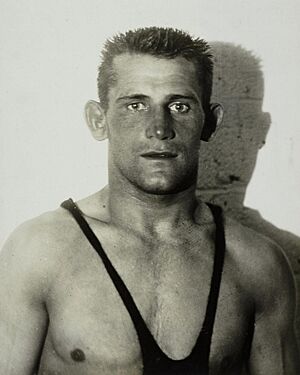Voldemar Väli facts for kids

Voldemar Väli at the 1928 Olympics
|
||||||||||||||||||||||||||||||||
| Personal information | ||||||||||||||||||||||||||||||||
|---|---|---|---|---|---|---|---|---|---|---|---|---|---|---|---|---|---|---|---|---|---|---|---|---|---|---|---|---|---|---|---|---|
| Born | 10 January 1903 Kuressaare, Estonia |
|||||||||||||||||||||||||||||||
| Died | 13 April 1997 (aged 94) Stockholm, Sweden |
|||||||||||||||||||||||||||||||
| Sport | ||||||||||||||||||||||||||||||||
| Sport | Greco-Roman wrestling | |||||||||||||||||||||||||||||||
|
Medal record
|
||||||||||||||||||||||||||||||||
Voldemar Väli (born January 10, 1903 – died April 13, 1997) was a famous Estonian athlete. He was a talented Greco-Roman wrestler who won two medals at the Olympic Games. He is remembered as one of Estonia's greatest wrestlers.
Contents
Voldemar Väli's Wrestling Journey
Voldemar Väli was born in Kuressaare, a town on the Estonian island of Saaremaa. He started learning to wrestle when he was 17 years old. Just four years later, he competed in the 1924 Olympic Games. Even though he didn't win a medal that time, it was just the beginning of his amazing career.
Winning European Titles
In 1926, Voldemar Väli won his first big award: a European title. This showed everyone that he was one of the best featherweight wrestlers in the world. He continued to be a top wrestler, later competing in a slightly heavier category called lightweight.
Olympic Achievements
Voldemar Väli won a gold medal at the 1928 Summer Olympics in Amsterdam. This was a huge achievement for him and for Estonia. He couldn't go to the 1932 Olympics because Estonia faced tough economic times and couldn't send a team. However, he returned to the Olympics in 1936 in Berlin, where he won a bronze medal.
National Success and Retirement
Väli was also very successful in Estonia. He won 19 national wrestling titles between 1922 and 1942. These wins were in both Greco-Roman and freestyle wrestling styles. In 1944, during World War II, he moved with his family to Sweden. He stopped wrestling professionally in 1945 after a final match in Sweden. In this match, he even beat the Swedish champion, Einar Karlsson.
Life After Wrestling
Before moving to Sweden, Voldemar Väli worked as a crane operator at the Port of Tallinn. In Sweden, he first worked with metal. Later, he and his wife started their own business, a factory that made dolls.
 | Aurelia Browder |
 | Nannie Helen Burroughs |
 | Michelle Alexander |

